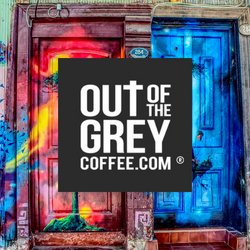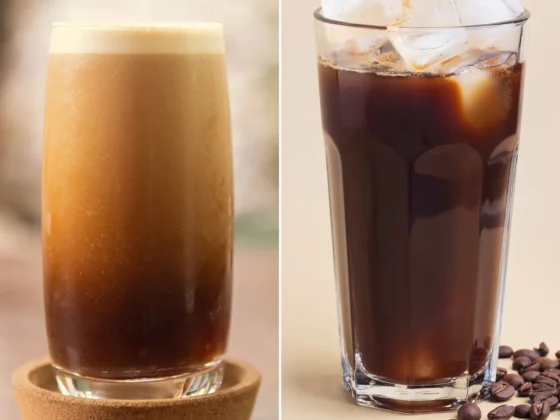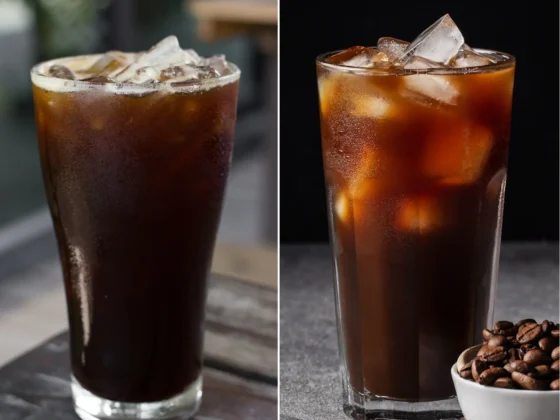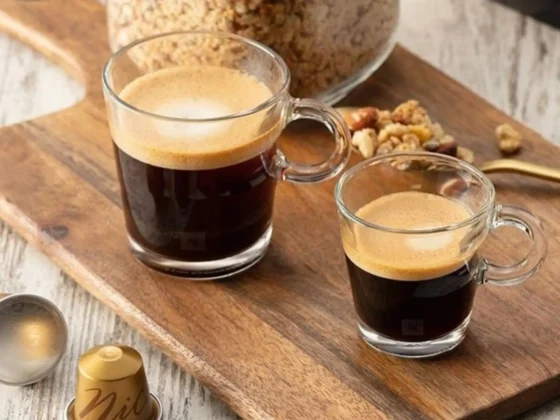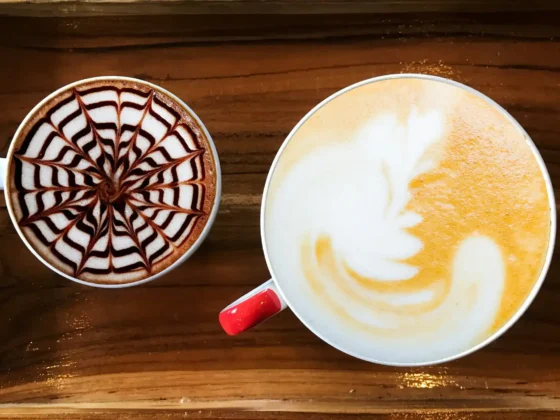Indisputably, two beverages that are held in high esteem by a considerable chunk of the global population are coffee and wine. Though conventionally enjoyed separately, an innovative trend in winemaking has surfaced, which amalgamates these two popular drinks, giving rise to a singular beverage: coffee wine. The taste of this unique blend is an intricate fusion of the rich flavors of these drinks, culminating in a distinctive, caffeine-laden concoction that traditional wine cannot provide. With its intriguing taste profile and novelty, this type of wine has garnered a surge in popularity in recent times, and understandably so. With this article, we aim to take a deep dive into the world of coffee wine, exploring its roots, production, health benefits, and much more.
What is Coffee Wine?
Coffee wine is an avant-garde libation, a true gastronomic crossover that marries the richness and opulence of wine with the bold, stimulating aroma and taste of coffee. This singular concoction, a recent arrival to the world of winemaking, has swiftly captivated the attention and affection of coffee and wine aficionados alike.
The intricate art of crafting this delectable liquid typically entails fermenting a potent blend of wine and coffee, often augmented with sugar and yeast to trigger and regulate the fermenting process. (1) The diversity of coffee types utilized in the brewing process is manifold, with some recipes relying on brewed coffee, while others on espresso as a foundational constituent.

The final product is an intricate and multifaceted drink, brimming with complexity and character. A libation that artfully fuses the caffeine-infused zest and punch of coffee with the refined depth and subtlety of wine. The resultant outcome can either be sweet or dry, contingent upon the varietal of wine utilized in the fermentation process, and the quantity of sugar incorporated.
One of the most fascinating qualities of this type of wine is its versatility, as it can be served in myriad ways. Savor it as a pre-dinner aperitif, indulge in it as an after-dinner treat, or relish it as an ingredient in a creative and masterful cocktail.
What Does Coffee Wine Taste Like?
Coffee wine is a beverage of unparalleled intricacy, with a diverse array of flavors and aromas that tantalize the senses. its fascinating taste is contingent upon several factors, including the varietal of wine utilized in the fermentation process, the type of coffee utilized, and the degree of sugar added to the blend.

As a general rule, this delightful beverage boasts a bold and rich flavor that harmonizes the characteristics of both beverages. Coffee bestows upon the beverage a profound, roasted essence, while wine contributes complexity and profundity to the coffee’s flavor profile. The outcome is a drink that is simultaneously sweet and bitter, imbued with hints of chocolate, caramel, and dark fruit.
Coffee wines come in diverse varieties; some are sweet, evocative of fruity sensations with a trace of bitterness emanating from the coffee. Others are dry, endowed with a more robust flavor, and accompanied by a smoky, woody taste from the coffee. The aging process can also affect the taste of this type of beverage, with some wines matured in oak barrels to grant them an idiosyncratic flavor.
Overall, the taste of this wine is a captivating expedition of intricacy and uniqueness, presenting an extensive range of flavors and aromas that are certain to gratify the palate. Whether you are a connoisseur of one of these beverages, or both, this enjoyable drink is an indispensable beverage that warrants a try.
What is Coffee-Infused Wine?
Coffee-infused wine, a tantalizingly exquisite beverage, amalgamates the robust and vigorous taste of coffee with the rich and intricate character of wine. It is an ingenious creation that transfixes the senses and enthralls the palate with its unique blend of flavors.
Creating this novel concoction requires adept mastery of two primary methods. Firstly, the conventional approach is to introduce whole coffee beans into the wine and let them permeate for an extended period, ranging from several days to weeks. This method facilitates the gradual amalgamation of the distinctive properties of the these two main ingredients, ultimately producing a sublime amalgam of flavors.

Secondly, a more avant-garde technique involves using a concentrated coffee extract, which is then directly infused into the wine. This method harnesses the concentrated essence of coffee, swiftly saturating the wine with its essence, culminating in a spectacular symphony of flavors.
In essence, this drink defies expectations and redefines boundaries. It is a sensory delight that captures the imagination, and ensures a unique and satisfying experience for all who indulge in it.
Is Coffee Wine the Same as Coffee-Infused Wine?
There exists a tendency to use the terms coffee wine and coffee-infused wine interchangeably, but it is imperative to acknowledge that there are fundamental disparities between the two beverages.
To elaborate, coffee wine is generally crafted through the process of fermenting a blend of coffee and wine, coupled with the inclusion of sugar and yeast to initiate the fermentation process. The resulting libation is an exclusive amalgamation of the two beverages, providing both the intense kick of caffeine and the intricacy and profundity of wine. (2)
Contrarily, infused wine is formulated by incorporating coffee beans or a coffee concentrate directly into the wine, allowing the flavors to fuse over time. This technique engenders a flavor profile that is distinct from coffee wine, as the coffee flavors are emphasized, and the wine serves as a foundation to enrich the coffee’s aroma and flavor.
Whilst both beverages provide a unique and palatable gustatory experience, they are unequivocally dissimilar beverages, each possessing distinctive traits. Coffee wine tends to be sweet or bitter, contingent on the coffee and wine implemented in the fermentation process, whilst infused wine is usually crisp and arid, with a more discernible coffee flavor.
The History of Coffee Wine: A Concoction of Innovation and Creativity
The precise genesis of coffee wine remains elusive, yet it is conjectured that a daring home brewer was the first to ferment coffee into wine. Regrettably, the archives of this early experimentation are non-existent, and the exact source of this type of drink continues to elude us.
However, it is universally acknowledged that the first commercial bottling of this wine occurred in the Philippines, situated in the northern region of Manila. Since the 1700s, coffee cultivation has flourished in the Philippines, and despite a recent decline in production, it remains a significant coffee producer.
It is speculated that the birthplace of this wine was in various towns of Cavite, Philippines, where coffee cultivation is preponderant. The rudimentary methodology used to produce its early renditions involved blending brewed coffee with wine and sugar to fashion an extraordinary and appetizing beverage.

With time, the recipe has undergone a metamorphosis, as winemakers have endeavored to blend different types of coffee and wine and have augmented the blend with additional ingredients such as spices and fruit to create an intricate and varied flavor profile. Presently, this type of beverage is concocted globally, using various techniques and nuances, resulting in a plethora of unique and delectable variations.
All in all, the chronicles of this enjoyable drink are a testament to the imaginative and inventive spirit of winemakers and coffee enthusiasts worldwide. While its origins may be shrouded in mystery, its enduring popularity and singular taste guarantee that it will remain a cherished beverage for years to come.
No products found.
How to Make Coffee Wine at Home?
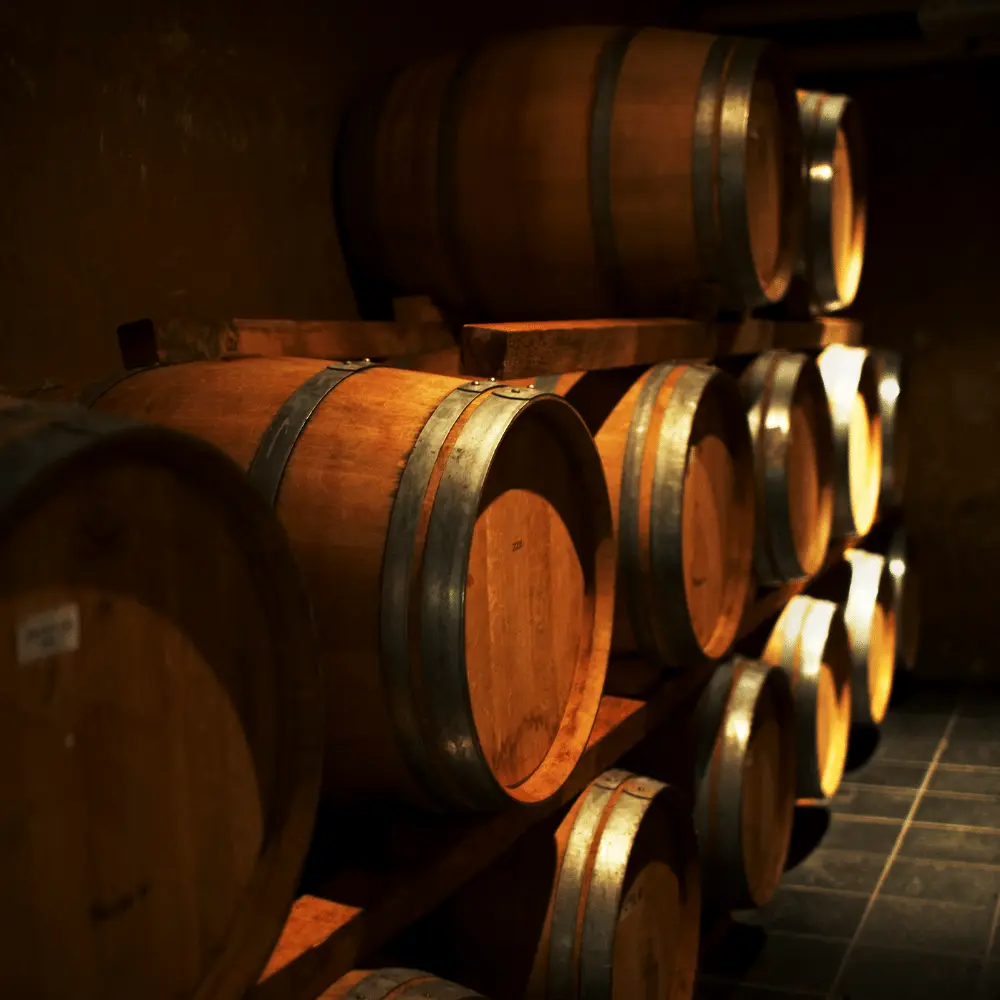
Making this type of wine at home can undoubtedly be regarded as a captivating experience. If you are eager to undertake this endeavor, here are the complex and intricate steps that you must follow:
The Ingredients Required:
To concoct the coveted wine, you must gather the following elaborate and sophisticated ingredients:
- 1 bottle of red wine
- 1 cup of robustly brewed coffee
- 1 cup of saccharine sugar
- 1 packet of sophisticated and intricate wine yeast
- Optional: you can add tannins to your wine, such as tea leaves, oak chips, or grape skins, to enhance its flavor.
The Brewing Process:
To brew the coffee that is required for your wine, you can either utilize freshly brewed coffee or prepare a coffee concentrate utilizing finely ground coffee beans. To concoct the coffee concentrate, combine 1 cup of coffee grounds with 1 cup of water and allow it to infuse for 12-24 hours. After this, strain the mixture through a cheesecloth or coffee filter to eliminate any remaining grounds.
If you desire to add tannins to your wine, introduce them to the mixture during the brewing process and allow them to steep for numerous hours before adding the yeast.
The Fermentation Process:
- Mingle the wine, coffee, and sugar in a voluminous pot or fermenting vessel. Vigorously stir the mixture until the sugar is dissolved.
- Introduce the wine yeast into the mixture and combine it thoroughly.
- Envelop the pot or vessel with a secure lid or cheesecloth and let it ferment for an extended period of 5-7 days in a warm, obscure location.
- After the fermentation process is complete, carefully transfer the wine into a pristine bottle or carafe and let it age for approximately 2-3 months before indulging in its luxurious flavor.
Overall, creating this wine in the comfort of your own home is a complex yet immensely rewarding process that requires a keen eye for detail, finesse, and patience. Do not hesitate to experiment with various combinations, and feel free to add a touch of your individuality by introducing additional spices or flavors.
The Intricacies of Making Coffee-Infused Wine at Home
Brewing a tantalizing and exceptional infused wine in the comfort of your abode is a delectable experience that can be accomplished with ease. Here are the guidelines that need to be followed to make this remarkable beverage:
Acquiring the Necessary Ingredients:
Before proceeding to the production process, it is important to have the following ingredients in possession:
- 1 bottle of red wine
- 1/2 cup of finely ground coffee beans
- Additional flavorings, such as vanilla extract or cinnamon sticks
The Process of Infusion: (3)
- Pour the wine into a large, clean jar or bottle.
- Add the finely ground beans to the wine and stir the ingredients thoroughly.
- Include any additional flavorings to enhance the aroma and taste.
- Completely seal the jar or bottle with a lid or cheesecloth and permit it to mature for 2-3 days in a chilly and dark area.
- After the lapse of 2-3 days, extract the wine by straining it through a cheesecloth or coffee filter to eliminate the grounds and any other flavorings.
- Transfer the infused wine into a clean bottle or carafe and let it age for approximately 2-3 weeks before consumption.
Serving Suggestions:
This wine is an exquisitely rich and versatile drink that can be enjoyed on its own or utilized as a foundation for cocktails. Several popular cocktails that utilize this type of wine include the Coffee Negroni, the Espresso Martini, and the Coffee Wine Sour. If you’re a fan of vodka, and would like to know how coffee mixes with the spirit, check out our guide on Coffee Vodka.
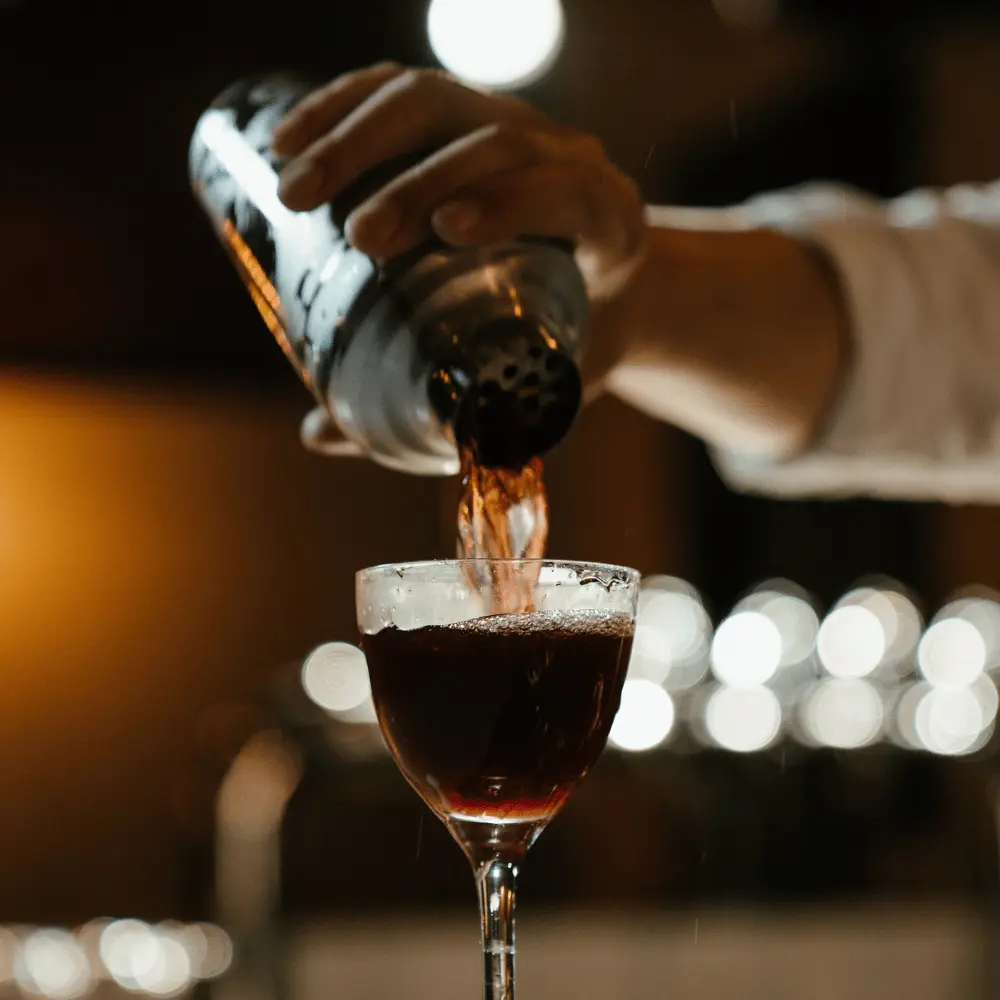
The method of making this beverage at home is a straightforward and entertaining process that enables you to experiment with various flavors and aromas. Endeavor to use different varieties of wine and coffee beans to produce a distinct and unforgettable drink that is sure to amaze your guests.
Health Benefits and Risks of Drinking Coffee Wine
This uniquely delectable beverage is known to harbor a diverse spectrum of potential health benefits and risks, depending on its consumption patterns. Unraveling the mysteries of this enigmatic and ambivalent drink, here is an exhaustive scrutiny of the key benefits and risks of consuming this delicious wine: (4)
The Benefits of Coffee Wine
- Antioxidant Quandary: Coffee and wine are known for their formidable antioxidant properties, which are vital for combating free radicals and inflammation.
- Digestive Conundrum: The tannins found in wine can help catalyze the production of digestive enzymes, thereby easing digestion and mitigating bloating and gas.
- Heart Disease Paradox: Moderate wine consumption has been linked to a lower risk of heart disease, primarily due to the presence of resveratrol, a compound abundant in red wine.
- Energy and Alertness Puzzle: The caffeine in coffee can boost energy and alertness, making it an ideal post-meal beverage.
The Risks of Drinking Coffee Wine
- Alcohol Overconsumption: It is imperative to consume wine in moderation to avoid the detrimental effects of excessive alcohol consumption, such as liver damage and addiction.
- Caffeine Dilemma: While caffeine can provide a temporary energy boost, excessive intake can lead to insomnia, anxiety, and other health issues.
- Dehydration Ambiguity: Coffee and wine can have a dehydrating effect on the body, emphasizing the importance of drinking plenty of water.
How to Consume Coffee Wine Safely
To savor the potential health benefits of coffee wine while minimizing its risks, consider these tips for safe consumption:
- Moderate Intake: Limit consumption to one or two glasses of wine per day, avoiding binge drinking.
- Adequate Hydration: Drink plenty of water to counteract the dehydrating effects of coffee and wine.
- Nocturnal Restraint: Refrain from consuming this type of drink late at night, as its caffeine content can disrupt sleep.
- Medical Vigilance: Be mindful of potential interactions between this delectable beverage and certain medications or health conditions, consulting a doctor beforehand, if necessary.
This type of wine can be a delightful indulgence that offers several health benefits, but only when consumed in moderation and with caution to avert the potential negative health effects.
Does Coffee Wine Contain Caffeine?
One question that often baffles consumers is whether it contains caffeine or not. Delving deeper into this caffeine conundrum, here is a detailed examination of its caffeine content:
The Caffeine Content of Coffee Wine
The precise amount of caffeine present in the wine may fluctuate depending on various factors, including the type and quantity of coffee used during the fermentation process, as well as the type and alcohol content of the wine.
How Much Caffeine is in Coffee Wine?
Determining the exact quantity of caffeine in the wine is challenging, owing to the variable nature of the aforementioned factors. However, in general, this delightful drink is likely to have less caffeine than a cup of coffee but more caffeine than a glass of regular wine.
The Effects of Caffeine in Coffee Wine
The caffeine present in the wine can offer a brief surge of energy and alertness, making it a popular choice for after-dinner drinks. Nonetheless, excessive caffeine consumption can lead to detrimental health effects such as insomnia, anxiety, and an increased heart rate.
How to Ascertain the Caffeine Content of Coffee Wine
If you are curious about the caffeine content of coffee wine, you can contact the manufacturer or check the label for details. Alternatively, you can attempt to create your wine at home, thus regulating the amount of coffee used and determining the caffeine content precisely.
It is undoubtedly a unique and fascinating beverage that does contain caffeine. Although the precise amount of caffeine can be challenging to ascertain, it is crucial to consume this beverage in moderation and avoid excessive caffeine intake to steer clear of any adverse health effects.
What are the Best Coffee Wine and Coffee-Infused Wine Brands?
Indulging in a novel and captivating beverage experience is an endeavor that every connoisseur yearns for. Though these infused wines have seen a surge in popularity in recent years, some exceptional examples such as Apothic Brew and Friends Fun Wine Coffee are unfortunately no longer available.
Currently, the best option for those seeking a coffee-infused wine is 19 Crimes The Deported Wine-Infused With Cold Brew, which masterfully blends the rich flavors of coffee with the complexity of wine. As the demand for coffee wines and coffee-infused wines continues to grow, enthusiasts can expect more innovative and tantalizing options to emerge on the market in the near future.
19 Crimes The Deported Wine-Infused With Cold Brew

The Deported, an exceptional red wine blend from 19 Crimes, has been ingeniously infused with the invigorating notes of coffee. This exceptional product constitutes a part of the celebrated 19 Crimes wine range that commemorates Australia’s convict history.
Key Features
- Red wine blend infused with cold brew flavors
- The rich and bold flavor profile
- Medium-bodied with a smooth finish
- Ideal for pairing with red meat dishes or bold flavors
- 13% alcohol by volume
Pros
- A unique flavor profile that combines the richness of red wine with the boldness of cold-brew
- A smooth finish makes it easy to drink
- A good option for those who enjoy both drinks
- Ideal for pairing with red meat dishes or bold flavors
- Offers a unique and memorable drinking experience
Cons
- May not appeal to traditional wine drinkers who prefer classic varietals
- The coffee infusion may not be to everyone’s taste
- Not suitable for those with caffeine sensitivity
- May not pair well with lighter dishes or desserts
This striking blend from 19 Crimes, has been infused with the bold and captivating notes of cold brew coffee, presenting an exceptional flavor profile. Though not universally palatable, this wine makes for a brilliant choice for individuals who yearn for an unconventional and extraordinary drinking experience. Its velvety finish and remarkable adaptability render it a suitable option for accompanying red meat dishes or indulging in as a standalone beverage.
On the whole, 19 Crimes The Deported Infused With Cold Brew presents an excellent value for the price point and justifies a tasting for those who possess an adventurous and inquisitive disposition towards the unconventional pairing of these two flavors.
No products found.
The Best Food Pairings with Coffee-Infused Wines
The domain of gastronomy is teeming with an array of delectable blends, and this type of wine stands out as an exceptional and unparalleled concoction. This particular blend proffers a multifarious and intricate flavor profile that can be paired with an eclectic variety of cuisines and dishes. For those aficionados of coffee-infused wine who yearn to embark on a new gustatory expedition, here are some of the best food pairings to experiment with:
Red Meat Dishes
- Steak: The audacious and rich flavors of the wine fuse impeccably with a succulent and moist steak, thus elevating the meat’s savory and robust flavors.
- Grilled lamb chops: The succulent and flavorsome meat of grilled lamb chops corresponds harmoniously with the velvety and lustrous texture of the wine, thus providing an unforgettable and harmonious gastronomic experience.
Chocolate-Based Desserts
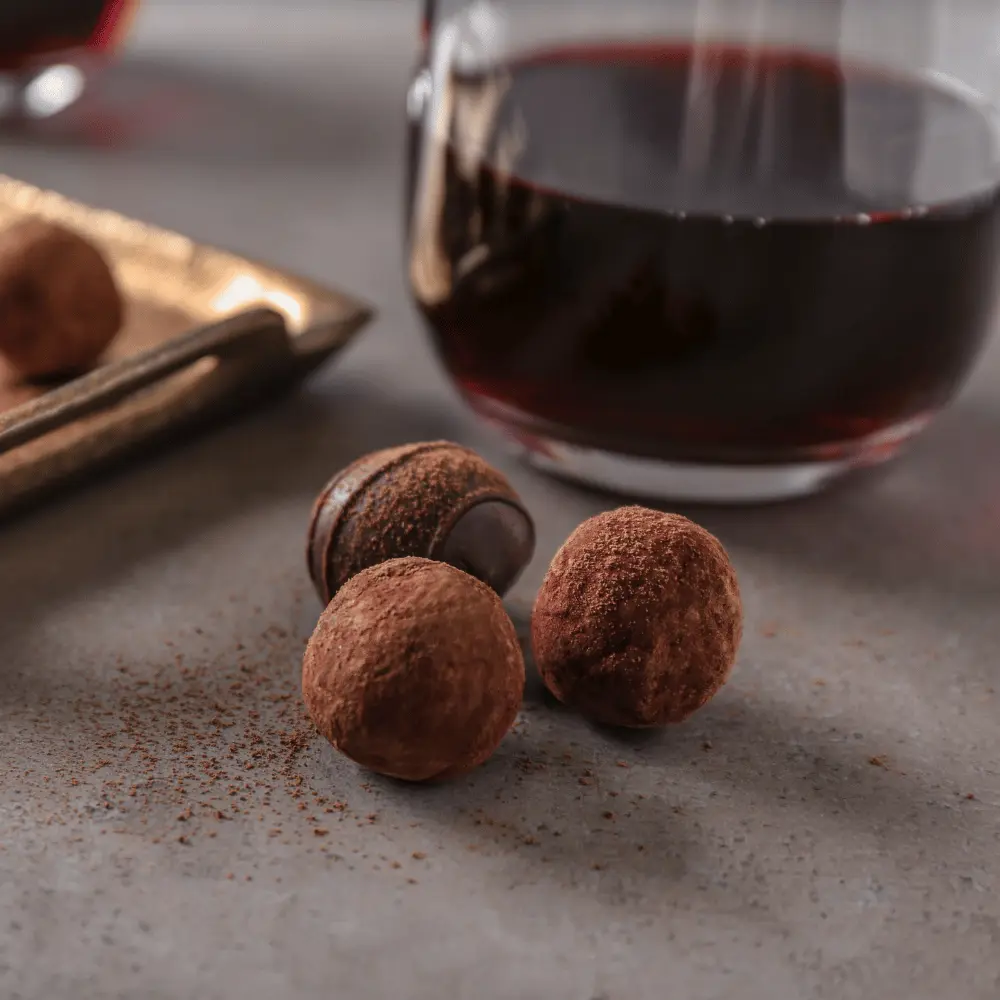
- Dark chocolate truffles: The profound and intricate flavors of this type of drink resonate in perfect harmony with the intense and bitter notes of dark chocolate, thereby resulting in a lavish and indulgent dessert pairing.
- Chocolate cake: The unctuous and sleek texture of chocolate cake counters the bold and potent flavors of the wine, leading to a perfectly balanced and mouth-watering dessert pairing.
Spicy Dishes
- Spicy beef curry: The bold and rich flavors of the wine effortlessly cut through the heat of a spicy beef curry, thereby imparting a refreshing and delightful balance to the dish.
- Chicken tikka masala: The redolent and fragrant spices in chicken tikka masala are complemented by the supple and velvety texture of the wine, resulting in a bold and flavorsome pairing.
Cheese
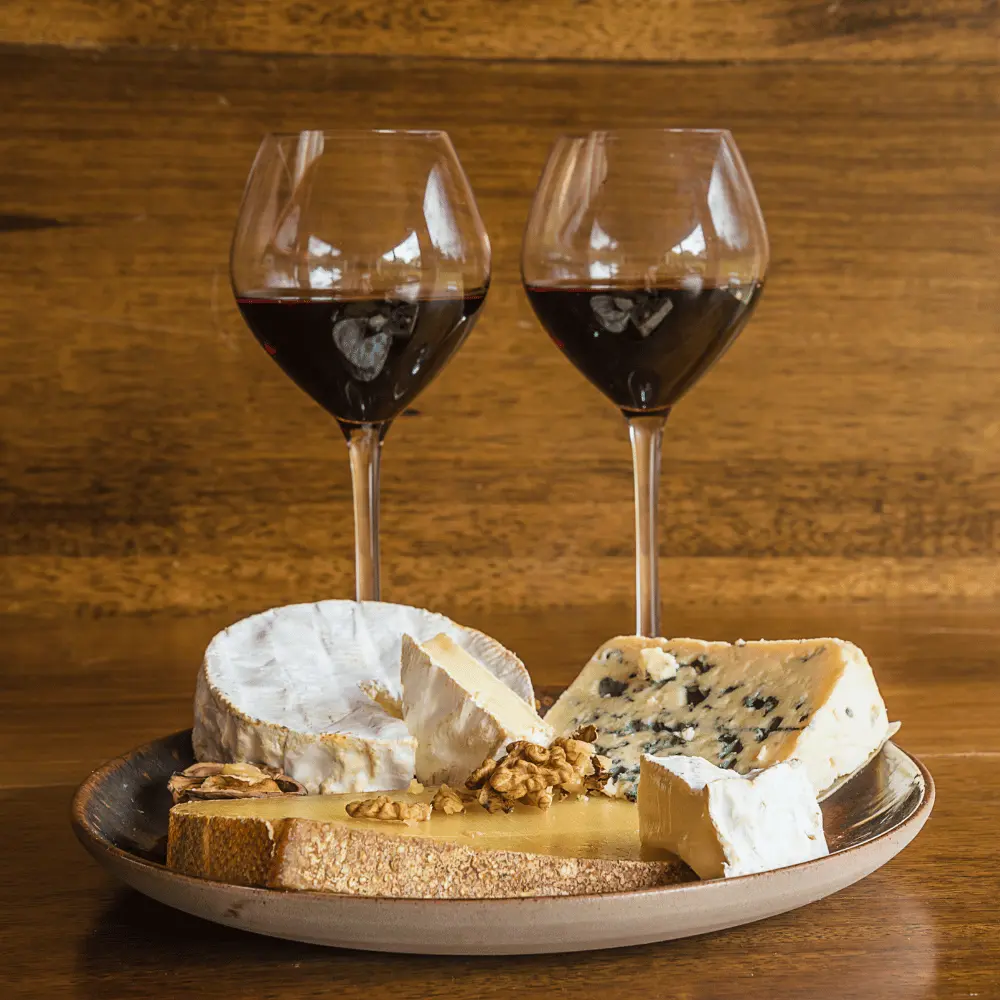
- Aged cheddar: The piquant and tangy flavors of aged cheddar supplement the bold and robust notes of the wine, thus giving rise to a refined and gratifying pairing.
- Blue cheese: The pungent and intense flavors of blue cheese correspond with the smooth and creamy texture of the wine, thereby bringing forth a bold and indulgent pairing.
This delightful beverage imparts a unique and versatile flavor profile that can be effortlessly paired with an assortment of dishes and cuisines. From red meat to spicy dishes and chocolate-based desserts, these food pairings are bound to raise the bar of your experience to a whole new level.
Conclusion
Undeniably, the exquisite and unparalleled fusion of coffee and wine gives rise to an enthralling and stimulating concoction that offers a myriad of rich and robust flavors. Coffee wine, with its invigorating caffeine content and intricate yet harmonious taste, provides a drinking experience that is unmatched and unparalleled, leaving an indelible impression on your palate. It is noteworthy that the consumption of coffee wine has both benefits and risks for your health, which are contingent upon the extent of moderation and caution exercised in its consumption.
Thus, a judicious and prudent approach towards the consumption of this type of wine can enable you to enjoy its potential benefits while avoiding any possible pernicious effects. Whether you are a fervent coffee aficionado, an ardent wine enthusiast, or merely an audacious and adventurous drinker, coffee wine is a beverage that you cannot afford to miss out on as it promises to gratify and impress your taste buds beyond measure.
FAQ
Type Of Coffee Beans Used To Make Coffee Wine
In making coffee wine, the sort of coffee beans utilized can be subjective to individual preference and accessibility. Nevertheless, it is generally suggested to use high-quality coffee beans that furnish a dense and intricate flavor profile. Popular coffee bean variations employed in the creation of this beverage encompass Arabica, Robusta, and Kona.
Can the Blend of Coffee and Wine Lead to Detrimental Outcomes?
Blending coffee and wine is not per se disadvantageous, given that it can engender extraordinary and delectable beverages, like coffee wine and wine-infused coffee. However, it is pivotal to exercise moderation when consuming these beverages, as excessive ingestion of caffeine and alcohol can culminate in detrimental health outcomes. Additionally, it is fundamental to experiment with diverse coffee and wine blends to uncover those that correspond with your taste preferences optimally.

